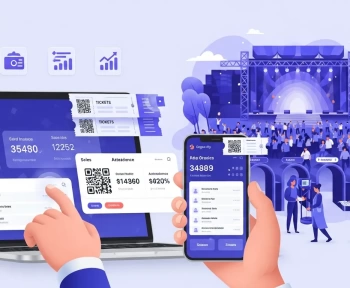The event industry has dramatically changed, especially with respect to handling transactions. Traditional cash-based systems are rapidly being replaced by cashless payment methods that may include RFID-enabled wristbands, mobile wallets, and contactless cards. Cashless payment solutions have become an event standard, including for large-scale festivals and corporate events, thanks to all the benefits they bring to organizers, vendors, and attendees. Let’s further discuss the top 10 advantages of implementing cashless payments for your events.
Table of Contents
1. Faster Transactions and Reduced Queuing Times
One of the most significant benefits of cashless payment systems in events is the speed of transactions. Cash transactions can be slow due to various factors such as counting change, handling cash, or technical glitches with card readers. Cashless systems such as RFID wristbands or mobile payments allow attendees to pay for a product with just a tap and drastically reduce the length of time of every transaction.
Shorter queues at bars, food stalls, and merchandise stands are created from faster transactions. Eventgoers spend less time in lines and more time watching and enjoying the event. This can lead to higher sales for vendors as people are more inclined to make additional purchases when the buying process is quick and seamless.
2. Enhanced Security and Fraud Prevention
Cash handling in events can create the risk of theft, fraud, and even loss. In comparison, cashless payment solutions help reduce all these risks because it does not have to handle physical currency on-site. This means that transactions are purely digital, thus exposing both attendees and vendors to a much more secure environment.
With cashless systems, the organizers will track every transaction and verify it, thus minimizing fraudulent activities. Additionally, if an RFID wristband or an event card is lost or stolen, organizers can promptly deactivate it and issue a new one, thus minimizing potential loss for attendees.
3. Increased Spending and Revenue Opportunities
What researches found was that cashless payment would encourage attendees to spend more on events. The convenience of cashless transactions gives a sense of encouragement to making impulse purchases since users are not constrained by the amount of cash they carry. This means a festival-goer might end up buying another drink or extra merchandise by using cashless transactions, especially if it is quick and easy.
Moreover, to make upselling and implement dynamic pricing, cashless systems are there to help. This is where event organizers and vendors can offer tailored promotions or discounts directly to attendees’ accounts or apps, hence giving more revenue-generating opportunities.
4. Real Time Event Monitoring and Attendee Insights
One of the most valuable advantages of cashless payments is the real-time information and insight. On the other hand, organizers don’t really get data from traditional cash payments, which makes it difficult to understand attendee behavior or spending patterns. With cashless systems, every transaction is tracked, thus providing a wealth of information about what attendees are buying, where they are actually spending, and their overall preferences.
This data will then be used by event organizers to enhance vendor placement, improve future event planning, and personalize the marketing of an event. For example, if data indicates that a certain food stand is constantly in demand, more space or resources can be allocated to similar vendors in future events.
5. Streamlined Refunds and Dispute Resolution
Cashless payment systems make it easier to handle refunds and address disputes. Cash-based events take quite some time for refunds or lost purchases, which makes attendees unhappy. Whereas, cashless systems can swiftly process refunds directly into a digital wallet or event card.
The transparency of digital transactions also reduces the likelihood of disputes, as each payment is recorded and tracked. If a guest has an issue concerning a purchase, event staff can easily look up the transaction to resolve the issue at hand.
6. Reduced Costs for Event Organizers
Cashless payment systems can save event organizers a lot of cost. Handling cash includes significant security, counting the receipts, and transporting it to and from the venue. By eliminating the need for cash, organizers can cut down on these costs and improve operational efficiency.
Also, cashless systems reduce the chances of human mistakes. Errors such as giving incorrect change or miscounting the cash lead to revenue loss. As for cashless payments, every transaction will be automated and accurate, meaning that costly errors will be minimized.
7. Enhanced Attendee Experience
Today, people need convenience, and this pertains to events as well. Thus, this is the very reason why cashless payment systems play a role in making the experience of an event much smoother and more enjoyable for a participant. Rather than thinking about how much cash you are carrying, or losing money, attendees attend the event and know they can make purchases with ease.
For events using RFID wristbands or similar technologies, cashless payments often integrate with other services like access control, VIP area entry, and personalized event schedules. This added level of convenience and customization enhances the overall event experience, making attendees more likely to return for future events.
8. Real-Time Financial Management
Real-time financial insights from cashless systems can be very beneficial to event organizers. With traditional cash transactions, it is a bit of an uphill task and time-consuming to track revenue and sales trends throughout the whole event. In essence, calculation and estimation by manual counting needs to be done. However, this is not the case in cashless payment systems since it allows event organizers to monitor financial performance in real time.
Therefore, real-time data will enable an event organizer to make informed decisions on where staff needs to be reallocated, what products need to be restocked, or tweaking pricing strategies to maximize revenue. Additionally, it becomes easy to reconcile post-event since all the transactions are already captured and can be easily analyzed.
9. Sustainability and Environmental Benefits
Cashless payment systems can contribute to the sustainability efforts of an event. Handling cash often involves printing tickets, receipts, and other paper documentation, which can add up to a significant amount of waste. By going cashless, events can reduce the need for paper products, contributing to a more environmentally friendly operation.
Many events that implement cashless systems also encourage the use of reusable RFID cards or wristbands, which further reduces waste. These systems can often be reloaded or used for multiple events, cutting down on the single-use nature of paper tickets and tokens.
10. Cashless Solutions are Scalable for Larger Events
Cashless payment systems are easily scalable, making them an ideal solution for events of any size. Whether it’s a music festival or a large-scale international event, cashless systems can be tailored to fit the specific needs of the occasion. As events grow in size and complexity, the benefits of cashless payments become even more pronounced.
For larger events, cashless systems help maintain organization and control over vendor transactions, attendee purchases, and access points. RFID technology, for example, can be used for cashless payments, access control, and attendee tracking all in one, making it an all-in-one solution for large-scale event management.
Conclusion
Undeniably, the benefits of cashless payment systems in events range from faster and more secure transactions to better data collection and environmental sustainability. This improves the experience for both the attendees and the organizers who make the events possible. As the event industry continues to evolve, cashless payment solutions will probably be the norm that shapes the future of how we experience festivals, concerts, and conferences.
For event organizers, planning to employ the cashless system may appear daunting, but the long-term advantages are above all challenges. The adoption of cashless technology has positively revamped the practice of running events, enabling organizers to create more efficient, profitable, and enjoyable events for the participants and all other stakeholders.




